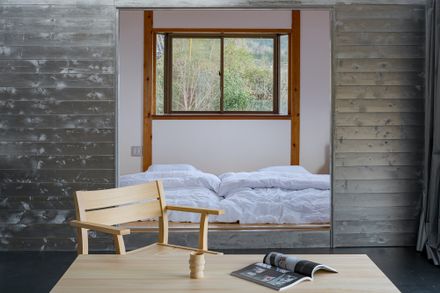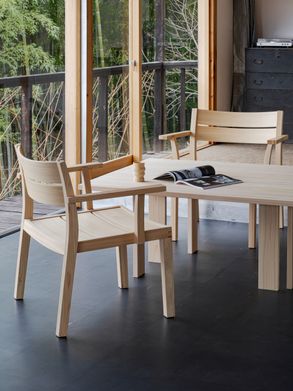
Villa Nagiso Renovation
ARCHITECTS
Otaa.llc
LEAD ARCHITECT
Yutaro Ohta
FORTIFICATION
Shisui Equipment
CARPENTER
Mitsuishi Building
DESIGN TEAM
Yutaro Ohta, Genya Nakayasu, Yuki Otsuka
INTERIOR WORK
Katsuno Wood
ELECTRICAL ENGINEERING
Yoshimura Electric
DIY COOPERATION 1
Uruha Tamura, Kouta Yoshioka, Keito Ueno, Mitsuki Kotoo
DIY COOPERATION 2
Chubu University, Musashino Art University, Shibaura Institute Of Technology, Volunteers' Association
PHOTOGRAPHS
Takashi Uemura
AREA
62 M²
YEAR
2025
LOCATION
Nagiso, Japan
CATEGORY
Lodging, Renovation
CULTIVATING THE COUNTRYSIDE
The town of Nagiso in Nagano Prefecture, where the site is located, is a place that even Japanese people rarely hear about.
Most of the land is surrounded by forest, and the area is home to the "Kiso Hinoki" brand of wood, which has become the identity of the community through the diverse traditional craft skills of its artisans, such as woodworking and hinokasa (hinoki hats).
This place, which has been crowded with tourists mainly from overseas in recent years, is also the hometown of my grandparents.
With its declining and aging population, Nagiso town is an advanced region, so to speak, and it is a microcosm of Japan's future.
I felt that putting down roots in this place and continuing to work as an architect would provide a hint for the future of architecture.
Therefore, we decided to purchase the land and buildings, renovate them, and plan, design, construct, and operate a hotel for rent.
First, in order to open the space to the rich tea plantation and mountain scenery, wooden fixed sashes were replaced.
In addition, all of the characteristic atrium space was painted silver, transforming the former wooden hut into a minimalist and unique space.
For the Japanese-style room, the old tatami mats were removed and replaced with "Kiso hinoki bark board," a flooring material developed jointly with Katsuno Lumber, a local forestry and lumber company in Minami-Kiso.
This flooring material is a luxurious strand board that utilizes the bark of the Kiso hinoki tree.
During the construction, we invited fragrance designer Megumi Fukatsu to create an original fragrance using Kiso Hinoki together with the students who were responsible for the construction.
We think of architecture in terms of its component parts and design, even the interior elements that are invisible to the eye.
The cups used in the hotel were also created using the Nagiso roroku technique to create a special piece with an original design. Through DIY and workshops, this architecture was designed not from a big plan, but as a series of small actions.
The world we will create in the future may be shaped by the accumulation of these small acts of craftsmanship.





















